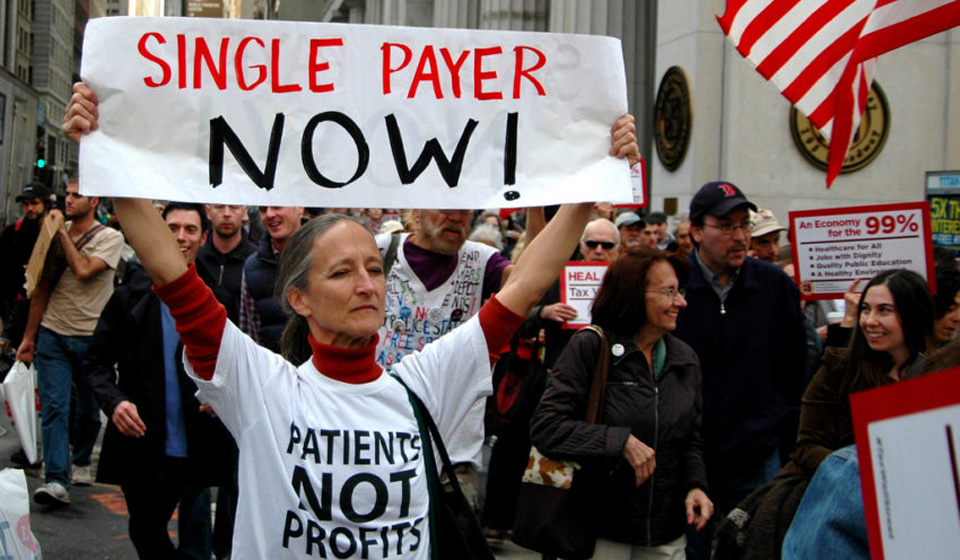
ST. LOUIS (PAI)—Two top advocates for Medicare For All – establishing a government-run single-payer health care system – are pleased with an AFL-CIO convention resolution backing that cause by name, even if it doesn’t mention specific legislation on Capitol Hill.
In an interview during the AFL-CIO Convention in St. Louis, Chuck Idelson of National Nurses United and Mark Dudzic of the Labor Campaign for Single Payer said the AFL-CIO health care resolution, to be adopted during the convention, emphasizes support for single-payer.
“It’s a very strong resolution, and it’s entirely consistent with Sen. Sanders’ bill,” mandating single-payer health care, Idelson said. “There’s a strong commitment to health care as a human right. And while it does not endorse any particular piece of legislation, it says the path is Medicare For All.” NNU brought an explicit pro-single-payer resolution to the conclave.
“We were really inspired by this and we look forward to pushing state and federal legislation” for single-payer, especially in New York and California, Dudzic added.
Sen. Bernie Sanders, Ind-Vt., and Rep. John Conyers, D-Mich., have introduced and pushed Medicare For All legislation for years. Both Sanders’ bill, S1804, and Conyers’ measure, HR676, have gone nowhere in the recent GOP-run Congresses, and drawn scant congressional support, until now.
But earlier this year, the AFL-CIO Executive Council explicitly backed Medicare For All. And Sanders’ run for the Democratic presidential nomination last year produced such enthusiasm for him and for the cause that one-third of the Senate – all Democrats – and a majority of House Democrats now back the legislation, too.
So do potential Democratic presidential hopefuls. And now, as part of an overall health care push, so does the AFL-CIO convention. The fed’s delegates voted on the measure during the conclave’s sessions.
“The United States is at a health care crossroads,” the federation’s resolution #6 started. “We either move forward toward making health care a basic right for everyone, or fall backward, with coverage and care increasingly out of reach as politicians actively take it away, employers cut back and higher prices make it ever harder to afford.
“Having the health care we need, no matter who we are and regardless of our circumstances in life, is fundamental to our well-being as individuals and as a nation.
“That is why the labor movement fought for more than a century to make quality health care a basic right in the United States. Our longstanding goal for achieving this is to move expeditiously toward a single-payer system, like Medicare For All, that provides universal coverage using a social insurance model, while retaining a role for workers’ health plans.”
The “social insurance model” the resolution refers to is the universal coverage system virtually identical to Social Security’s structure – and its universal reach.
“Any such system must guarantee everyone can get the health services they need without exclusions or financial barriers to care, and with access to high-quality doctors, hospitals and other health care providers,” the fed declared.
But the government wouldn’t quite cover everyone, though it would become the primary care provider. The resolution added any Medicare For All law must “not diminish the hard-fought benefits union members have won for themselves and all working people.”
It also said the Department of Veterans Affairs health care system should remain the “primary direct provider of fully integrated care to veterans,” and it advocates keeping the ability of “multiemployer and other worker health plans…to administer core health benefits and to provide supplemental benefits, each on a fully tax-advantaged basis, and keep a strong federal role without shifting costs to states.”
Those parts of the resolution fly directly in the face of GOP dogma. Right wingers have campaigned for years to privatize veterans’ health care, in the name of profits, while wrecking the government-run system that employs tens of thousands of unionists.
And many House Republicans want to tax workers’ health benefits. So did Democratic President Barack Obama, in the Affordable Care Act. Union and worker pressure got lawmakers to postpone that so-called 40 percent “Cadillac Tax” until 2020. The resolution calls on solons to repeal it.
And the AFL-CIO resolution not only repeals the tax and endorses single-payer, but would, before it’s fully implemented, extend the current Medicare eligibility age from 65 down to “at least 55.”
“This would extend health care provided on a single-payer basis to millions more Americans. Further, this could help preserve coverage for pre-65 retirees, whose current health benefits earned through work are increasingly at risk. We also should create a public health insurance option that builds on Medicare or Medicaid as an alternative to for-profit insurance companies,” the fed said.
Dudzic said single-payer backers realize they have an uphill battle on Capitol Hill, so they’re also working for it in several states, with California and New York topping the list. Others are potentially Massachusetts, Minnesota and New Mexico. The California Senate, after NNU lobbying, has passed a state single-payer bill, SB562, and NNU members hit the streets for on Oct. 14-15. But the State Assembly speaker, a Los Angeles Democrat, stalled it.
So did Democratic Gov. Jerry Brown, who questioned how to pay for it. SB562 can be brought back during next year’s legislative session in the nation’s largest state, home to one of every eight residents. “And the leading candidate for governor” in 2018, Lieut. Gov. Gavin Newsom, whom NNU has already endorsed, strongly backs single-payer, Idelson said.












Comments